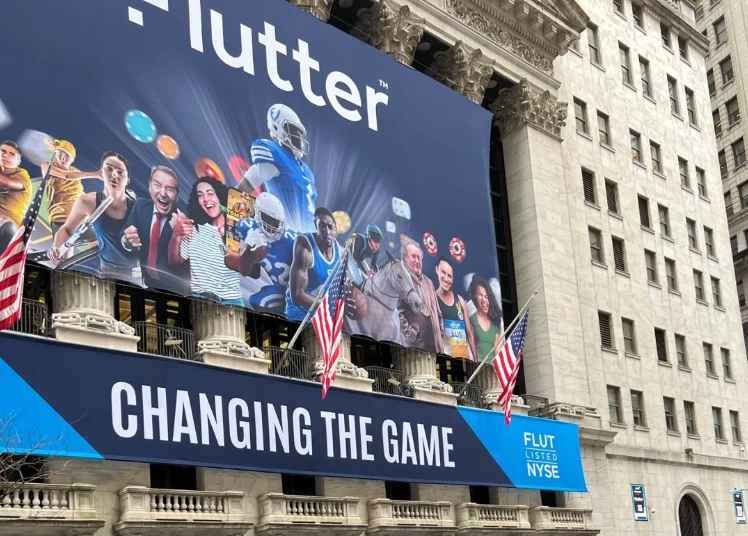Flutter’s US listing: Everything you need to know

Flutter’s listing on the NYSE wasn’t exactly a quiet affair. A large Flutter poster and banner were unveiled right at the front of the exchange in preparation for 09:30 EST (14:30 GMT), when Flutter shares officially began trading. Clearly, the company behind FanDuel, Paddy Power and Sky Betting and Gaming wanted to enter the race with a bang.
In December, Flutter announced that it was working to list its shares on the NYSE by 29 January 2024. Coming in right on target, the listing represents a turning point for sports betting investment in the US, says Birkin.

For one, stocks listed in the US normally trade at a higher valuation than stocks listed in London. And Flutter’s name alone carries significant weight.
“There are few opportunities for US investors to get materially exposed to the growth of the US online sports wagering or igaming market – DraftKings is the main opportunity,” Birkin observes. “While Flutter isn’t a US online pureplay investment, it has meaningful exposure to the market and that is likely to be of genuine interest to investors.”
This will help to build Flutter’s status in the US – something that already has a foundation, but is set to rocket to new heights over the next few years.
“When the majority of your revenues and earnings are coming from a certain market and you can get higher valuations with more liquidity, it makes sense to move your listing to that location.”
Big reputation
One significant benefit of listing on the NYSE is the natural draw of investors looking to store cash in the next big thing.
“While there are funds that have the ability to direct a portion of their investment outside of the core investment area, being listed on the NYSE will without doubt open the doors to more potential investors,” Birkin explains.
So Flutter is cementing its place in the US, a market with more than a few big-hitters. But will the likes of DraftKings and BetMGM be shaking in their boots?
“I don’t think that it will be a positive for them, but I also don’t think it’s going to lead to any major shift,” Birkin admits. “Potentially it could turn the heads of some investors and the change in accounting will make the FanDuel and DraftKings businesses more easily comparable.”

At the end of the day, he says product and technology offerings take priority over where a company is located.
“Product and technology – along with sensible marketing and promotions – are going to be more important than where each operator is listed.”
Making a mark on America
Flutter is taking this US transition so seriously that it has proposed a primary listing on the NYSE. This will be presented to shareholders at Flutter’s 2024 AGM on 1 May. If approved, the transition could occur in Q2 or Q3.
While the decision to prioritise the NYSE clearly won’t hinder Flutter’s trajectory, Birkin believes it might not have the market-share impact the company is hoping for.
“The FanDuel business is obviously already based in the US and the overall Flutter business has plenty of resources – so I don’t see them doing this because they’re in need of further investment into the business to drive their US market share,” he muses.
“There are benefits to being listed in the US, but their market leading positioning shows that not being listed there hasn’t hampered their ability to operate or take market share.”
When looking at Flutter’s positioning in the market, it helps that its full-year 2023 results were released just under two weeks ago. The company’s US performance was continually positive throughout the year, particularly in terms of net win.
What is Flutter’s ultimate goal?
With its listing opening up new opportunities for investment, Flutter likely has some big plans for the US in 2024.
One of Flutter’s main goals, says Birkin, will be to consolidate its position as a market leader by taking more share in the igaming space – a strategy that has been modelled before.

“While some people may view the US market as unique, in many ways it’s the same story being played out that has happened many times in many other markets,” he says. “Paddy Power did this successfully in the UK market many years ago, where growth was primarily led by sports, before a number of years where there was a strong tail-wind from growth in the igaming segment.
“William Hill also successfully grew their online business with a big push into igaming from their sports heritage.”
He believes FanDuel – as an existing leader in US sports betting – will also follow this well-trodden path.
“The same is likely to be the plan for FanDuel – maintain a sports wagering market leadership and at the same time accelerate the overall growth rate of the business by increasing their lower share in the igaming market.
“Scale matters and having such scale in sports is naturally going to translate to gains in igaming.”
